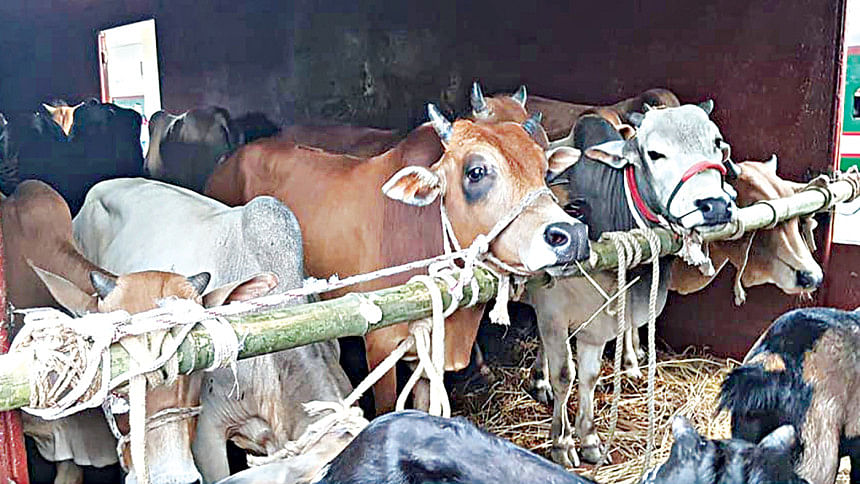Cattle train receives lukewarm response

A "cattle train" service rolled out by Bangladesh Railway seems to have fallen flat as just a single locomotive carrying 200 sacrificial animals for Eid-ul-Azha began its journey to Dhaka on Saturday.
Cattle traders are uninterested in the special rail service as road transport is more convenient despite its higher cost, according to various sources.
"Most cattle traders in the country's northern and southern districts were informed of the special rail service through local livestock departments but their response was quite poor," Md Nasir Uddin, a divisional commercial officer of Bangladesh Railway, told The Daily Star.
Bangladesh Railway had made special arrangements to transport sacrificial animals to Dhaka between July 17 and July 19 but due to the sparse turnout, only a single train carrying 100 cows and 100 goats will likely make the trip this year.
"However, we may run more trains if the number of orders goes up ahead of Eid," Uddin said, adding that they were still urging cattle traders to avail the service.
Besides, carrying cattle by rail is far cheaper than any other form of transport as it costs just Tk 11,000 for a wagon that can hold at least 20 to 25 cattle.
"So, it will cost no more than about Tk 500 per head of cattle shipped from Chapainawabganj to Dhaka," Uddin said.
After being loaded with 80 cows at Chapainawabganj station, another 100 goats were added at the Boral Bridge station in Vangura upazila of Pabna.
Earlier, the train was loaded with 20 goats at Rajshahi station, where it was inaugurated by Mihir Kanti Guho, general manager of Bangladesh Railway's west zone.
"The train then set off for Dhaka at 4:30pm on Saturday and will likely reach Dhaka by 3:30am the next morning," said Md Anwar Hossain, the divisional transportation officer of Bangladesh Railway in Pakshey.
After speaking to a number of cattle traders, it was found that they see the special rail service as nothing but an unnecessary hassle.
"We can load a truck with a minimum of 15 cows directly from our farms and have the cattle delivered to our targeted haat in Dhaka for about Tk 12,000," said Md Shah Alom, a leading cattle trader based in Pabna.
But in the case of rail transport, the cattle must first be delivered to the station and then again transported to haats after disembarking the train.
"So, we prefer road transport even though rail transport is comparatively cheaper as it does not offer the same benefits," he added.
Similarly, Md Abdul Kader, a leading cattle trader of Vangura's Haropara village, told The Daily Star that they avoid the rails since road transport was mostly hassle free.

 For all latest news, follow The Daily Star's Google News channel.
For all latest news, follow The Daily Star's Google News channel. 



Comments